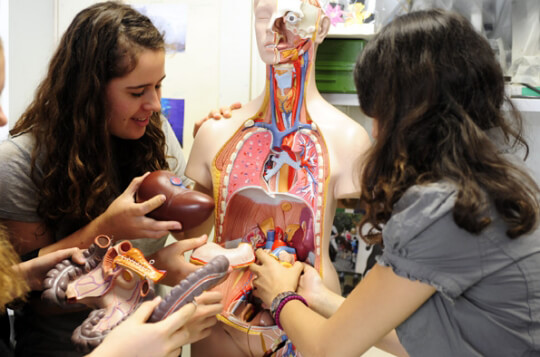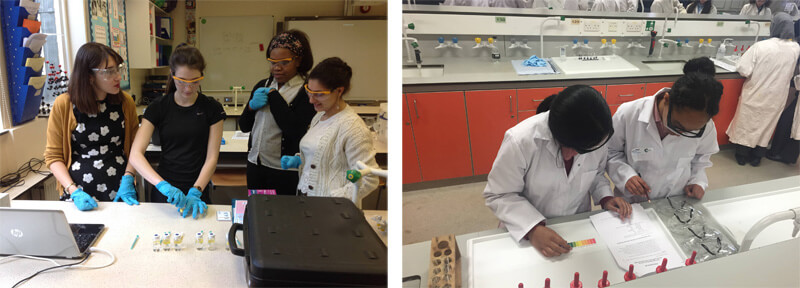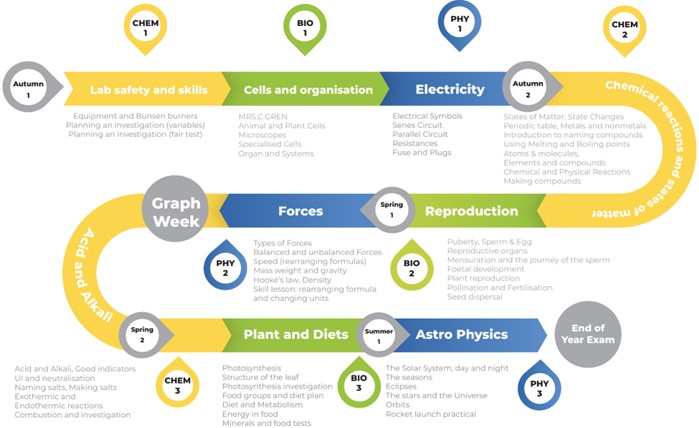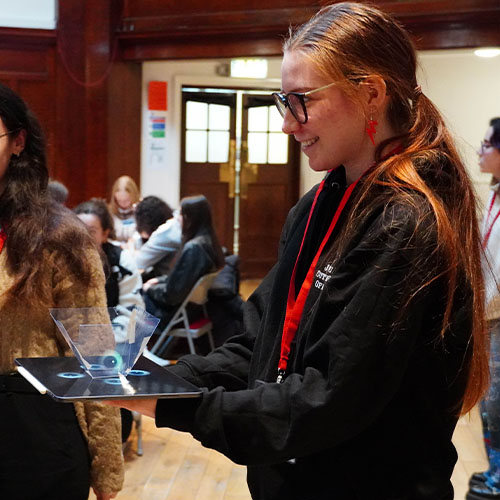Flow-Flow admin info: Please choose stream layout on options page.
Science
Nobody boasts about their ignorance of literature, but often it is socially acceptable to claim an ignorance of science. As a department we aim to ensure that our students are well-educated in Biology, Chemistry and Physics so that they grow up well-informed about the importance of science.
Through their studies in Science, our pupils acquire a full understanding and knowledge of the concepts, principles and applications of Science so that they may become confident citizens in a technological world and are suitably prepared to embark upon post-school studies. We develop skills that are relevant to the practice of Science in everyday life. We stimulate curiosity, interest and enjoyment in Science.
In their first year of scientific exploration at Francis Holland, pupils develop a solid foundation in the key concepts and principles of science. Through a combination of theoretical knowledge, hands-on experiments, and interactive activities, students will cultivate their curiosity, critical thinking skills, and scientific inquiry abilities. Our goal is to foster a lifelong love for science and equip students with the fundamental knowledge and skills necessary for further scientific exploration.
Here is an overview of the key topics covered in the Thirds (Year 7) Junior Science curriculum:
Throughout the year, students engage in a variety of learning experiences, including laboratory experiments, group projects, research assignments, and interactive simulations. The curriculum emphasises the integration of scientific knowledge with real-world applications, encouraging students to apply their learning to everyday situations.
Assessment methods include both formative and summative assessments, such as quizzes, practical experiments, written reports, and presentations. Regular feedback is provided to support their learning progress and identify areas for improvement.
At Francis Holland School Regents Park, we strive to create an engaging and inclusive learning environment, where students are encouraged to ask questions, explore ideas, and develop a passion for science. We look forward to an exciting year of discovery and scientific exploration in the Year 7 Junior Science programme.
Welcome to the Biology Department
“The capacity to blunder slightly is the real marvel of DNA. Without this special attribute, we would still be anaerobic bacteria and there would be no music.” Lewis Thomas
Biology at FHS is all about taking ideas from everyday life, taking them further and making connections with other aspects of the living world. We are passionate about inspiring every pupil so that that they can share in the exhilaration of understanding the connections between ourselves and the living world around us.
The Biology department comprises three full-time members of staff and three part-time members of staff. Their enthusiasm and zeal for the subject help maintain high A Level numbers and a large proportion of girls studying A Level Biology go on to complete Biology-related degrees at university. The Biology teaching staff have a wide range of skills and expertise ranging from Biochemistry to Environmental Science. The variety of interests adds to the appeal of the subject for many girls.

Curriculum
Key Stage 3
In the Thirds (Year 7), the girls follow the Junior Science curriculum.
In the Lower Fourth (Year 8), pupils are taught Biology separately from the other two sciences, by subject specialist teachers. Each pupil will receive one Biology lesson per week, and we follow the ISEB Common Entrance Examination. The emphasis is on building a foundation of knowledge and understanding, whilst developing the necessary skills to become an outstanding scientist.
GCSE
From the Upper Fourth (Year 9), pupils study the Edexcel IGCSE and girls are expected to complete the Triple Award. In Upper Fourth, each class receives one Biology lesson per week. In the Lower Fifth and Upper Fifth, the year group is divided into five groups, with each class receiving two lessons each week. The Upper Fourth begins with an introduction to key biological concepts which can then be applied in greater detail throughout the rest of the IGCSE course. Areas covered include both animal and plant biology, as well as biochemistry and micro-biology.
A Level
Students study the OCR A Level course at FHS. Biology is a linear A Level, which means there is no formal coursework. There are also no external examinations in the Lower Sixth year. This means that there is more time for learning and assimilating material. Biology A Level is highly synoptic, which means that students are required to make and understand links between everything they learn. This makes the A Level particularly challenging, but also deeply satisfying as understanding is achieved at a deep and elemental level. Biology is one of the most popular subjects at A Level and is in the top three subjects chosen at FHS and nationally. Each year a large percentage of pupils go on to study Biology-related courses at university including Biological Sciences, Human Sciences, Medicine, Veterinary Science, Anthropology, Neuroscience, Biomedical Science and Sports Science.
Why study Biology?
As with the other sciences, biology helps us to build up a whole plethora of skills including research, problem solving, organisation and analytical skills.
If you study biology, you will likely find yourself working on group projects, which will help you build your teamwork and communication skills too.
Biology is a key subject for lots of STEM careers, particularly in healthcare, medicine and jobs involving plants or animals. The list is extensive and includes: nursing, dentistry, forensic science, psychology, physiotherapy, botany, environmental science, zoology, geology, oceanography, pharmaceuticals, energy, teaching, science writing, genetics and research.
It is also important to remember that biology is excellent preparation for non-scientific careers, thanks to the skills it provides – everything from analytical thinking to writing reports. It is a well-regarded academic subject that carries weight on any CV.
Beyond the Curriculum
The Biology Department runs a range of extra-curricular clubs and activities. Green Fingers club makes the most of the school’s greenhouse, while MedSoc helps prepare older students for application to Medical, Dentistry and Veterinary Schools. Dissection Club and Biology Society also run on a fortnightly cycle, and allow pupils to extend their learning beyond the confines of exam specifications.
We aim to enhance learning by taking it outside of the classroom through day trips, such as to the Science Museum and London Zoo. A Level students further their learning through lecture days and fieldtrips for practical techniques. Our Lower Fifth Biologists also participate in the International Biology Olympiad.
Welcome to the Chemistry department
Francis Holland has a dynamic and thriving Chemistry department. Staffed by three passionate teachers each with a further degree in their own area, every student is taught by a subject specialist.

Curriculum
Outstanding lessons in Chemistry are delivered from the outset with all students studying the subject at IGCSE level. Experimentation is a crucial aspect of the study of Chemistry and all girls carry out practical work regularly as part of their experience of the subject. These experiments are used to reinforce and extend knowledge and understanding as well as to ensure the development of the skills needed to carry out research and investigate problems in Chemistry.
We are proud of our uptake at A Level and the number of students going on to study Chemistry and related disciplines at top universities.
As public examinations approach, all members of staff in the department provide revision clinics outside of the usual timetable, and are always available to arrange smaller study sessions should a student wish to discuss their work in more detail.
Key Stage 3
In the Thirds (Year 7), pupils follow the Junior Science curriculum.
In the Lower Fourth, pupils follow a four unit course which provides a firm foundation in the fundamental principles of Chemistry allowing for the development of more demanding concepts in the future. The first unit looks at pure substances and mixtures; the second covers physical and chemical changes; the third is a more detailed study of acids/neutralisation, whilst in the fourth, students consider the reactivity of metals and how this determines the method of extraction. After the Summer examination, students take part in the Lower Fourth Science Fair.
GCSE
The Edexcel IGCSE Chemistry course is taught over three years, beginning in the Upper Fourth. The course is assessed via two papers at the end of the Upper Fifth, with questions on both theory and experimental techniques. At Francis Holland, the Chemistry department ensures that each student is prepared for these examinations in terms of depth of knowledge and experience of practical work.
The following topics are covered across the three years:
UIV – states of matter; elements, compounds and mixtures; atomic structure; The Periodic Table; chemical formulae and equations; rates of reaction; ionic bonding; covalent bonding; types of structure; gases in the atmosphere.
LV – recap of bonding and structure; metallic bonding; acids, alkalis and titrations; acids, bases and salt preparations; calculations; elements in Groups 1 and 7; redox reactions; electrolysis; extraction and uses of aluminium; chemical analysis.
UV – further calculations; energetics; crude oil; Organic Chemistry including polymerisation; equilibria.
A Level
We follow the AQA A Level in the Lower and Upper Sixth. The course is assessed via three papers at the end of the two years which test students on their knowledge and understanding of the theoretical concepts taught as well as the practical techniques required for the experimental aspect of the programme. This consists of twelve experiments which must be carried out and understood in detail. Students formally write up and record their results in laboratory books as they would if they were following a science course at undergraduate level. The Practical Endorsement is recorded separately to the A level grade on the final certificate.
The course is broken down into three areas: Organic, Inorganic and Physical Chemistry.
The following topics are covered across the two years:
- Organic – Alkanes; Halogenoalkanes; Alkenes; Alcohols; Aldehydes and Ketones; Aromatic Chemistry; Amines; Carboxylic Acids and derivatives; Polymers; Isomerism; Amino Acids, Proteins and DNA; Organic Analysis; Organic Synthesis.
- Inorganic – Periodicity; Group II – The Alkaline Earth Metals; Group VII – The Halogens; Properties of Period 3 elements and their oxides; Transition Metals; Reactions of Ions in Aqueous Solution.
- Physical – Atomic Structure; Amount of Substance (The Mole); Bonding; Energetics and Thermodynamics; Kinetics and Rate Equations; Equilibria; Redox; Electrode Potentials; Acids and Bases.
Why study Chemistry?
Chemistry is a well-respected and intellectually demanding A Level. Studying Chemistry makes life a little less mysterious – it means you get to know and understand why and how things react and change. Pharmaceuticals, food production, materials, climate change, energy supplies, forensics, cosmetics, technology, clothing; Chemistry is everywhere!
Chemistry A Level is an essential requirement for anyone who wants to study Medicine, Veterinary Science/Medicine or Dentistry. Chemistry is also useful for those wanting to study anything science-related at university – Biochemistry, Biology, Physics, Chemistry, Pharmacology, Engineering, Chemical Engineering, Natural Sciences.
The skills of analysis, logic, reasoning and evaluation gained from studying Chemistry are also very transferable to almost any career including accountancy, IT, teaching, law, management consultancy and marketing, etc. It is a highly regarded academic discipline which leads to a myriad of exciting and varied opportunities.
Beyond the Curriculum
As well as delivering lessons with excitement, an element of challenge and a wealth of hands-on opportunities, we offer a diverse range of co-curricular activities, events and clubs to complement learning.
Messy Chemistry Club meets every week. Primarily run by enthusiastic Sixth Form chemists, this club allows for demonstration and experimentation, building confidence in pupils’ practical skills.
The Salters’ Chemistry Festival provides an opportunity for Lower Fourth students to take part in an investigative competition against other schools using the laboratories at one of the London universities.
The Lower Fourth Science Fair requires all students to work in pairs to investigate a new and innovative area of Science. Taking place after the Summer examinations, the students spend their time carrying out independent research into an area of their choice, and then present their findings to the rest of the school. After the heats, the main evening event invites parents, staff and students to see the best presentations judged by a highly regarded scientist, often from a local university.
Girls in the Upper Fourth, Lower Fifth and Upper Fifth are given the opportunity to take part as a team in the Royal Society of Chemistry’s Top of the Bench Competition. Their general knowledge of Chemistry is tested on a series of challenging rounds of questions against other schools in the London area with the winner going forward to the national competition. Once Top of the Bench has taken place the students involved form Chemistry Research Club which meets to discuss and investigate up-to-date areas of Chemistry of personal interest. These have included the effectiveness of different antacids, the pros and cons of waste disposal in space and the possibility of using cryogenics to preserve and extend life. All girls from these years are welcome to attend this club.
We regularly attend the GCSE and A Level Science Live! events hosted in London, giving students in the Upper Fifth and the Lower Sixth the chance to hear lectures from world leaders in science, such as Professor Andrea Sella and Dr Ben Goldacre.
Girls in the upper years are encouraged to take part in University College London’s Lecture Series. These lectures, which take place on a weekly basis and are just a short walk from the school site, are diverse and varied, with recent topics including the Chemistry of the Periodic Table and the Hidden World of the Atom.
Sixth Form chemists are given the option to take part in the Chemistry Olympiad, run by the Royal Society of Chemistry, and the University of Cambridge Lower Sixth Chemistry Challenge. Both of these written papers pose demanding questions, giving students a flavour of Chemistry at a more advanced level and extending their thinking beyond the confines of the A Level course. A team is also entered in the Cambridge Chemistry Race.
Welcome to the Physics Department
“I think physicists are the Peter Pans of the human race. They never grow up and they keep their curiosity.” Isidor Isaac Rabi
At FHS, physics is an interesting, interactive, and useful subject. Learning physics at school, college, and beyond is very rewarding because it is at the centre of everything around us. Physics explores fascinating questions such as the origins and future of the universe, the nature of black holes, and the potential for time travel. If you’re curious and always seek to understand why things happen, studying physics can give you answers. It forms the basis of most modern technologies and is crucial for global well-being in the future.
Curriculum
Key Stage 3
In the Thirds, pupils follow the Junior Science Curriculum.
In the Lower Fourth, pupils are taught Physics separately from the other two sciences by subject specialist teachers. Each pupil will receive one Physics lesson per week, following the ISEB Common Entrance Examination. Pupils study classic physics topics but with an emphasis on how these concepts affect their everyday life. Topics covered include Light, Energy Transfers, Forces and Movement, and Magnetism.
GCSE
From the Upper Fourth, girls study the Edexcel IGCSE and girls are expected to complete the Triple Award. The final examination consists of two papers and covers all aspects of theoretical and practical Physics. Topics include Forces and motion, Electricity, Waves, Energy resources and energy transfers, Solids, liquids and gases, Magnetism and electromagnetism, Radioactivity and particles and Astrophysics. Students are encouraged to sign up for exciting and regular lectures hosted by UCL (Science Centre Lectures | UCL Department of Physics and Astronomy – UCL – University College London)
A Level
The A-Level Edexcel course is assessed through three written papers. The course includes numerous practicals, and 16 core practicals are evaluated, leading to an A-Level Certificate of Practical Competency in Physics. The Physics A-Level curriculum helps us understand the world around us, the world inside us, and the world beyond us. Physics challenges our imagination with concepts like relativity and quantum theory. Discoveries in physics, such as computers, the internet, and lasers, have significantly changed our lives. Physics encompasses the study of the universe from the largest galaxies to the smallest subatomic particles.
Why study Physics?
The career opportunities available are as vast as the subject itself due, in part, to the transferable skills gained whilst studying physics. These transferable skills make physicists significantly more employable as employers see a physics qualification as an indication of someone who will immediately be an asset to the organisation. Physicist attributes include the following:
- A logical and numerate mind
- The ability to solve problems
- Communication skills developed through report writing and presentations
- Computing and practical skills
- Teamwork and flexibility (essential for lab work and projects)
Physicists have diverse career opportunities in research, technology, academia, and government sectors due to their strong analytical skills. They contribute to ground-breaking discoveries in various fields, design electronic devices, work in finance and environmental science, teach and mentor, and also take on roles in policy-making, national defence, and space exploration. Physics is an exciting science that is highly relevant in our modern world. Studying physics is not only thrilling but also leads to diverse career opportunities across many different fields.
Beyond the Curriculum
Physics, Engineering and Innovation at FHS
The Physics staff at FHS organize several co-curricular clubs, including the Robotics and Raspberry Pi Club, Data Science Club, and SciFi Club. They also provide training for the Physics Olympiad for Sixth Form pupils and celebrate women in Physics with termly Physics Birthday Parties honouring the birthdays of great women in Physics (see for example Wu Chien Shiung, Carolyn Parker, and Caroline Herschel). Additionally, the department arranges a bi-annual trip to NASA, where students participate in a weeklong training course and competition at Space Center Houston. Furthermore, we host a yearly Physics symposium called ‘We Do Physics‘, aimed at girls studying A level Physics.
The department also actively engages in various Engineering and Computing competitions. Including the PA Raspberry Pi competition in 2023, where our team of LIV pupils achieved a remarkable victory, winning the Innovation Award at this esteemed event. Furthermore, our LVI team triumphed in the Industrial Cadet Gold Award competition in the same year, earning the esteemed title of ‘Project of the Year‘. In 2024, a team of LV pupils earned their Silver Industrial Cadet Award taking part in the European Space Agency’s CanSat competition. Pupils at FHS have also taken images from the onboard cameras on the ISS,
with a team of UIV pupils achieving ‘Flight Status’ in the ESA sponsored AstroPi coding competition.
These fantastic achievements contribute to making the Physics department (along with the other FHS science and mathematics departments) national leaders in STEM, winning the Muddy Stilettos Excellence in STEM Award 2024.













